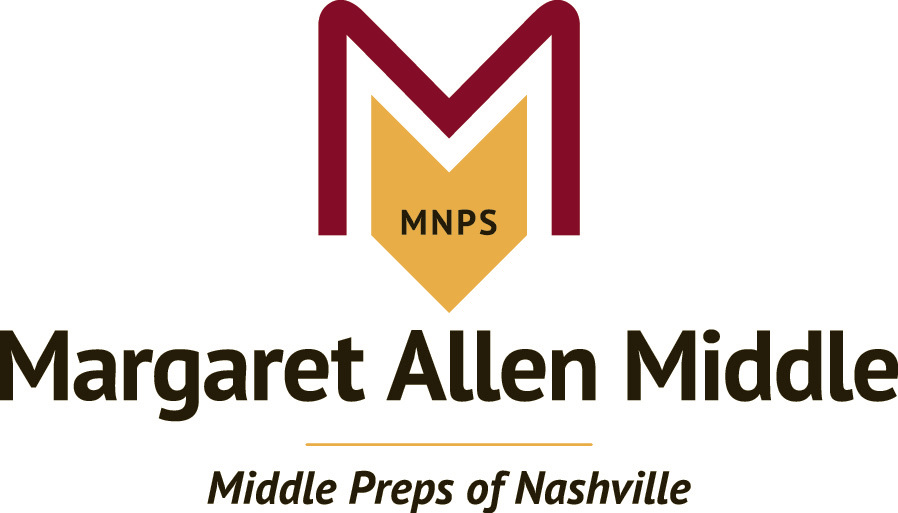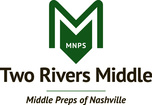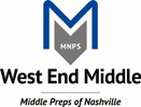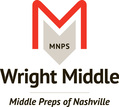|
Each year, the National Center for Education Statistics hosts the STATS DC Data Conference. This year's conference was held in Washington D.C. on August 1-3. Two MNPS employees presented at this conference.
Laura Hansen, MNPS Director of Information Management and Decision Support, was part of a expert panel on Wednesday, August 2nd entitled, A Tense Marriage: Governing the Relationships Among Data Interoperability, Security, and Privacy. This session discussed the tension between balancing the needs to support students and teacher in experiencing high quality learning experiences while maintaining appropriate barriers and privacy protections for students. Dr. Margie Johnson, MNPS Collaborative Inquiry Coordinator, co-presented with Dr. Stephanie Wilkerson, president of Magnolia Consulting, on Wednesday, August 2nd about MNPS' journey to implementing collaborative inquiry data use practices throughout the district. The session entitled, A District's Journey of Implementing Effective Data Use Practices, shared MNPS's data journey toward developing and implementing the Data-Informed Decision-making Ecosystem, of which collaborative inquiry is the heart of the ecosystem and serves as a guide for empowering educators to use data, no matter the source, for making informed decisions. Tools developed to support the implementation of the ecosystem, including the Teacher Data Use Survey and MNPS IC Map for Collaborative Inquiry were shared with participants. The PowerPoint for this session is available HERE. (Stephanie and I also have a published article mentioned in the PowerPoint. If you would like a copy of it, please email me requesting a copy.) The presentations from the conference should be available online soon. If you want to check out their website, you can access it at http://www.mnpscollaboration.org/collaboration-corner-blog/ci-update-do-you-understand-the-words-coming-out-of-my-mouth. If you need any support with collaborative inquiry and/or have a story to tell, please contact Margie Johnson at margie.johnson@mnps.org.
0 Comments
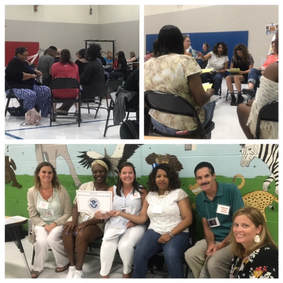 Are you familiar with the MNPS Poverty Simulation? It was developed by the Missouri Association for Community Action (http://www.communityaction.org/povertysimulations/) and brought to MNPS and led by Allison Buzard, MNPS Equity and Diversity Coordinator to help us learn about the daily circumstances some of our families face on a regular basis. On August 4, 2017, I had the privilege of helping with the MNPS Poverty Simulation as a vendor while Hull Jackson Montessori School and Jones Paideia School educators participated in the simulation. During the simulation, I was a representative for the Office of Immigration and Customs, which I selected because all of my children are immigrants, and we had to go through the process of getting them US Citizenship. In this role, I had to deport undocumented participants either by having their name provided as part of the simulation directions or by them being in trouble with law enforcement. The critical part of the simulation is to see the behaviors that are exhibited during the simulation. It certainly is a wonderful learning experience. I thank Allison for bringing this professional learning experience to MNPS. Furthermore, I thank her for the partnership of having schools take a data dive using the collaborative inquiry process as a follow-up discussion for establishing an action plan for supporting our students. If you are interested in using collaborative inquiry for facilitating data conversations and leveraging collaborative expertise, please contact Margie Johnson at margie.johnson@mnps.org. Collaboration Spotlights: JE Moss Elementary, Goodlettsville Middle, CTE Cohort, and Joelton Middle8/4/2017 Beginning the School Year with Collaborative Inquiry According to John Hattie (2015), “the largest barrier to student learning is within-school variability” (p. 1). He recommends that what works best in education is empowering schools to leverage the collaborative expertise of the educators within a building. If often tell teams that I work with that if we had the answer, then we would have implemented it already. However, education faces complex issues today.
Therefore, MNPS’ Collaborative Inquiry process, developed by the MNPS Community of Practice (Haynes Middle, Margaret Allen Middle, Two Rivers Middle, West End Middle, and Wright Middle), is about empowering MNPS educators to use data and educator expertise for addressing a variety of complex issues in order to ensure all MNPS students are successful. I am excited to share that three schools started the 2017-2018 school year off by engaging in collaborative inquiry to have deep conversations about a variety of topics.
If you have a collaborative inquiry story to share and/or need support with the collaborative inquiry process, please feel free to contact… References: Hattie, J. (2015). What works best in education: The politics of collaborative expertise. London, UK: Pearson. |
Email Subscription
Click HERE to subscribe to receive emails for the blog posts. Archives
February 2018
Categories
All
|
- Home
-
Workshop Warehouse
- Collaborative Inquiry for Data Use Workshop (Got Data? Now What?)
- Fishbone and Logic Model Workshop Materials
- Innovation Configurations Materials
- Creating an Evaluation Plan
- Facilitating Collaborative Inquiry Workshop (Dr. Laura Lipton)
- Group Data Exploration (PLI 2016)
- Collaborative Inquiry Community of Practice
- JE Moss Elementary Leadership Team Meeting
- 2016 NCES STATS DC Presentations
- Una Elementary Leadership Team
- Haynes Middle Prep-August 1, 2016
- August 2, 2016--Jere Baxter Middle
- 2016 NTC Nashville Analytics Conference
- Glencliff ES Leadership Team--Sept. 15, 2016
- Haynes MS Leadership Team Culture and Climate Meeting--Sept 19, 2016
- Sept 27, 2016 Two Rivers Leadership Team Meeting
- Rose Park Culture and Climate--2016
- Two Rivers SIP Goal Setting--Sept 20, 2016
- Curriculum and Instruction Meeting--Sept. 30, 2016
- Two Rivers--October 10, 2016
- John Early Culture and Climate--2016
- CTE Cohort--October 11, 2016
- Apollo Middle Milestone Meeting
- Murrell--Culture and Climate 2016-2017
- Margaret Allen--Jan 4, 2017 Culture and Climate
- Head Magnet Middle--Jan 4, 2017
- Apollo Middle--Jan 10 & 25, 2017
- IT Creswell Vision and Mission
- Dr. Springer Literacy CoP
- Two Rivers SIP Process Feb & Mar 2017
- East Nashville SIP March 2017
- East Nashville Behavior Plan May2017
- Family Engagement Data Dive
- Leading Collaborative Inquiry
- DuPont Tyler Middle Vision and Mission
- Facilitating Collaborative Teams
- 2017 SEL Conference Culture and Climate Change
- JE Moss Elementary Leadership Team Meeting--2017
- Goodlettsville Middle Vision and Mission
- CTE Cohort--July 26, 2017
- Joelton Middle Vision and Mission
- Whites Creek High Freshman Academy Vision and Mission
- Goodlettsville Middle Poverty Simulation Follow-Up Meeting
- Exceptional Education Coaches
- Hull Jackson Montessori Poverty Simulation Follow-Up Meeting
- Central Office Poverty Simulation Follow-Up Meeting
- Jones Paideia Poverty Simulation Follow-Up Meeting
- Cole Elem BHAG Fall 2017
- Cole Elem Culture and Climate--2016
- NAZA Data Dive Nov 3, 2017
- Metro Data Coord Meeting Nov 16, 2017
- 2017 Learning Forward Workshop
- Two Rivers Dec 2017 Culture and Climate
- MNPS Learning Tech Jan 2018
- MNPS SE Quadrant Leadership Meeting Jan 2018
- Margaret Allen Middle Jan 2018 Culture and Climate
- MNPS Early Learning Jan 2018
- Lakeview Elementary Jan 2018
- Wright MS SIP Process Jan 2018
- Cane Ridge HS Student Data Chats Jan 2018
- Antioch Middle Spring 2018
- Whites Creek HS Feb 2018
- 2019 Wright MS Leadership PLC
- July 2019--JE Moss Elementary Leadership Team Meeting
- Collaboration Corner Blog
- MNPS Data Guides
- Meeting Structures and Strategies
- Feedback
- Collaborative Inquiry Working Group
- Reading List
- Home
-
Workshop Warehouse
- Collaborative Inquiry for Data Use Workshop (Got Data? Now What?)
- Fishbone and Logic Model Workshop Materials
- Innovation Configurations Materials
- Creating an Evaluation Plan
- Facilitating Collaborative Inquiry Workshop (Dr. Laura Lipton)
- Group Data Exploration (PLI 2016)
- Collaborative Inquiry Community of Practice
- JE Moss Elementary Leadership Team Meeting
- 2016 NCES STATS DC Presentations
- Una Elementary Leadership Team
- Haynes Middle Prep-August 1, 2016
- August 2, 2016--Jere Baxter Middle
- 2016 NTC Nashville Analytics Conference
- Glencliff ES Leadership Team--Sept. 15, 2016
- Haynes MS Leadership Team Culture and Climate Meeting--Sept 19, 2016
- Sept 27, 2016 Two Rivers Leadership Team Meeting
- Rose Park Culture and Climate--2016
- Two Rivers SIP Goal Setting--Sept 20, 2016
- Curriculum and Instruction Meeting--Sept. 30, 2016
- Two Rivers--October 10, 2016
- John Early Culture and Climate--2016
- CTE Cohort--October 11, 2016
- Apollo Middle Milestone Meeting
- Murrell--Culture and Climate 2016-2017
- Margaret Allen--Jan 4, 2017 Culture and Climate
- Head Magnet Middle--Jan 4, 2017
- Apollo Middle--Jan 10 & 25, 2017
- IT Creswell Vision and Mission
- Dr. Springer Literacy CoP
- Two Rivers SIP Process Feb & Mar 2017
- East Nashville SIP March 2017
- East Nashville Behavior Plan May2017
- Family Engagement Data Dive
- Leading Collaborative Inquiry
- DuPont Tyler Middle Vision and Mission
- Facilitating Collaborative Teams
- 2017 SEL Conference Culture and Climate Change
- JE Moss Elementary Leadership Team Meeting--2017
- Goodlettsville Middle Vision and Mission
- CTE Cohort--July 26, 2017
- Joelton Middle Vision and Mission
- Whites Creek High Freshman Academy Vision and Mission
- Goodlettsville Middle Poverty Simulation Follow-Up Meeting
- Exceptional Education Coaches
- Hull Jackson Montessori Poverty Simulation Follow-Up Meeting
- Central Office Poverty Simulation Follow-Up Meeting
- Jones Paideia Poverty Simulation Follow-Up Meeting
- Cole Elem BHAG Fall 2017
- Cole Elem Culture and Climate--2016
- NAZA Data Dive Nov 3, 2017
- Metro Data Coord Meeting Nov 16, 2017
- 2017 Learning Forward Workshop
- Two Rivers Dec 2017 Culture and Climate
- MNPS Learning Tech Jan 2018
- MNPS SE Quadrant Leadership Meeting Jan 2018
- Margaret Allen Middle Jan 2018 Culture and Climate
- MNPS Early Learning Jan 2018
- Lakeview Elementary Jan 2018
- Wright MS SIP Process Jan 2018
- Cane Ridge HS Student Data Chats Jan 2018
- Antioch Middle Spring 2018
- Whites Creek HS Feb 2018
- 2019 Wright MS Leadership PLC
- July 2019--JE Moss Elementary Leadership Team Meeting
- Collaboration Corner Blog
- MNPS Data Guides
- Meeting Structures and Strategies
- Feedback
- Collaborative Inquiry Working Group
- Reading List
 RSS Feed
RSS Feed

